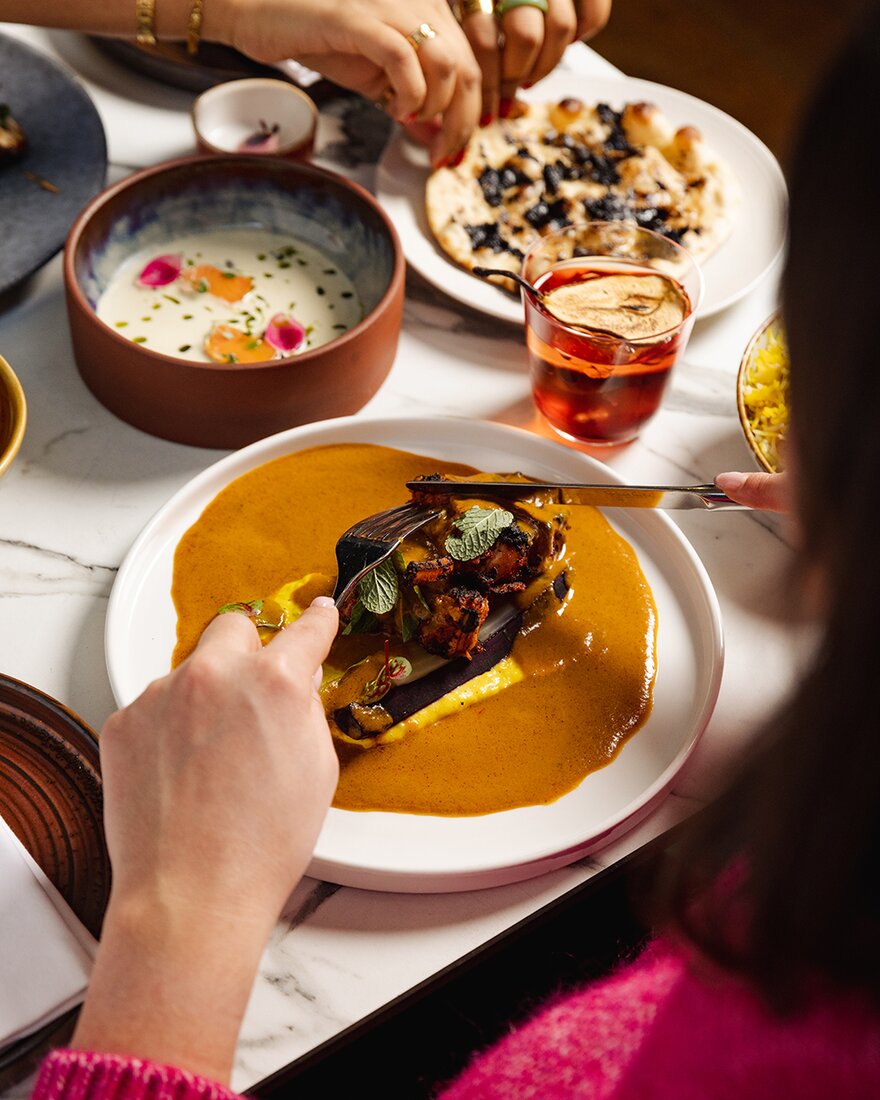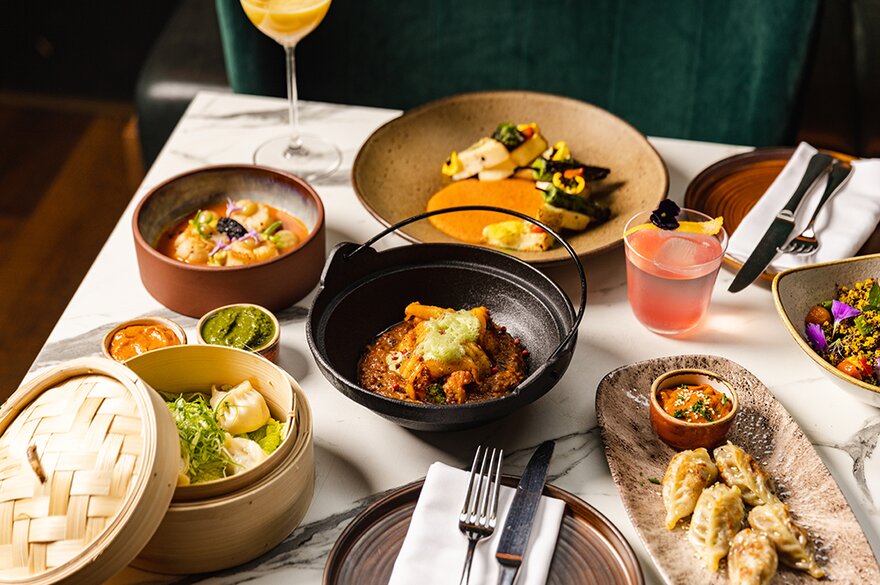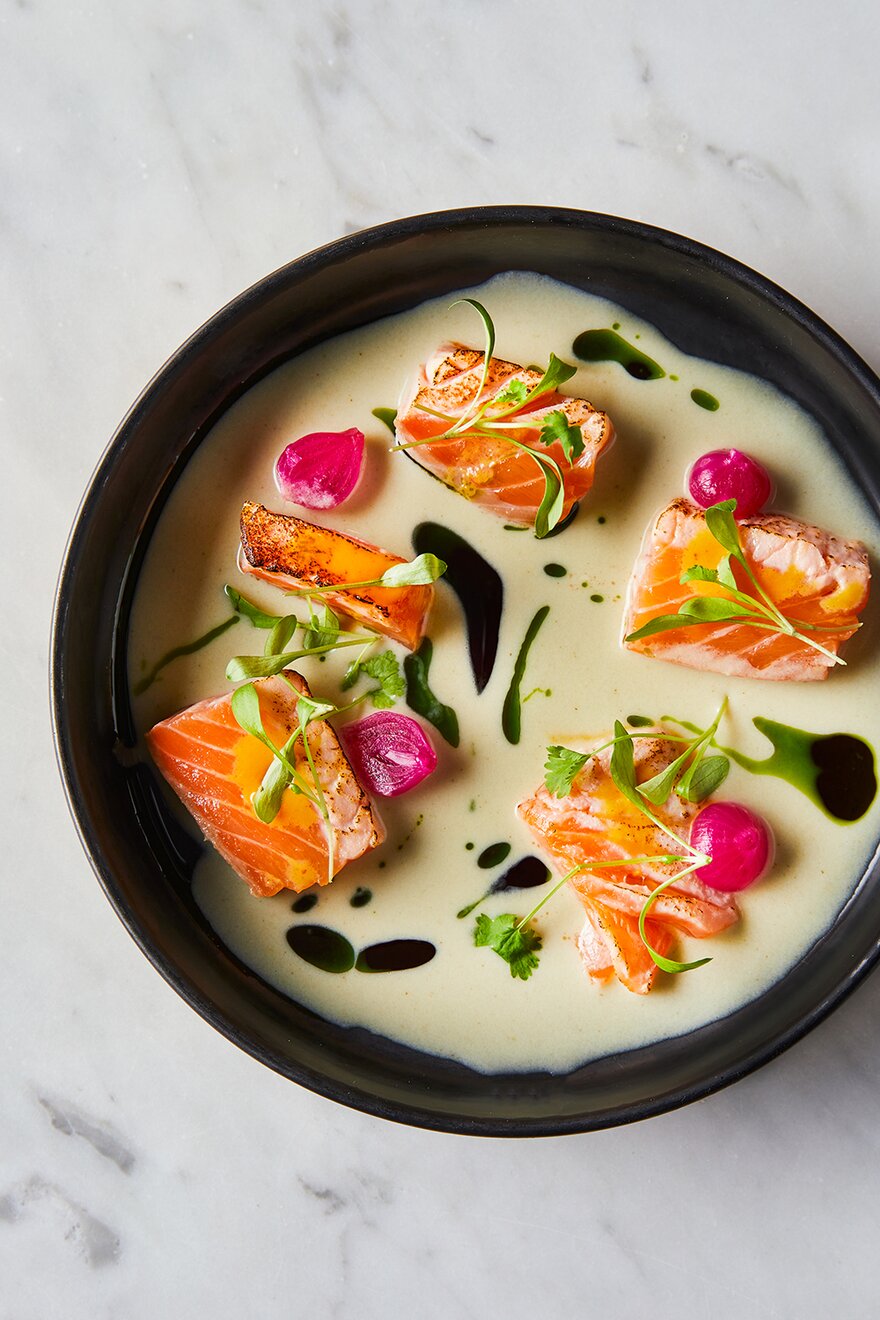Though Farzi means ‘fake' in Urdu, the dishes at Dhwani Agarwal's restaurant promise fun and flavour. Discover how she's taking fusion to the next level
When Dhwani Agarwal told her uncle, chef Pradeep Tejwani, that she wanted to follow in his footsteps, he suggested she find a different career path.
Tejwani, who Agarwal says was her biggest source of inspiration througout her upbringing in Mumbai, worked in a restaurant at a five-star hotel and would allow her to be both his guinea pig and sous chef.
"It was out of concern that he suggested I go for something else," Agarwal says. "When I questioned him as to why, he said that it's hard for women to survive in this industry."
She adds: "It was a struggle initially, and there was a point when I went to him and I said, ‘I can't do it anymore', but he said to me: ‘You can't give up now, you've made a choice, so you have to stick to it'." More than a decade on, Agarwal, now head chef at modern Indian bistro Farzi in London's Haymarket, is on a mission to showcase her native cuisine to British diners and "not just the basic curries that the world is aware of".
Agarwal, who took over the role late last year, says: "If you speak to anyone around the world about Indian cuisine, they're only aware of a very limited section – it seems that chicken tikka masala or butter chicken is all that they know."
Farzi's menu features authentic flavours, but she grants herself the freedom to be influenced by other cuisines, creating something "a little bit different". Dal chawal arancini – one of Farzi London's signature dishes – showcases the concept to a tee.
Agarwal says: "We take influence from Italian cuisine, where arancini which is made out of risotto rice and mixed with meat and cheese. But at Farzi we prepare it with kitchari, a mixture of lentils and rice, which is a staple and a go-to comfort food for Indian households. We present it with traditional accompaniments: a pickle, in the form of a pickle mayonnaise, roasted papad and a chutney, which is a tomato salsa."
This approach comes from the word Farzi, which translates to fake in Urdu and references the restaurant's modern, playful take on Indian cuisine.
"It's a fun way to say that a particular dish is not the food in its traditional form, but rather that we have made an interpretation of that particular dish and are presenting it in a different way. They are traditional meals reimagined to create plates that are more appealing and palatable."
Diversity leads to creative menus
Growing up in a large, extended family in a vibrant, culturally diverse city meant Agarwal was nourished by a variety of food choices. This diversity made her want to learn and experiment and laid the foundation for her culinary inquisitiveness, she says.
"Since I can remember, my uncle was always cooking in the house. When I was a kid, he ran his own restaurant and he used to take me there. He and his team created new dishes and he would let me taste them.
"Likewise, at home, he would make a new form of a dish on every family occasion. He is very passionate about food and I was always awed by the recipes he tried and was privy to the magic behind creating those recipes."
Agarwal cut her teeth in the kitchens of the Taj Mahal Palace, a five-star hotel in Mumbai in 2008, after which she took a role at the hotel's Masala Kraft restaurant. Early on in her career, she says she faced a challenge in convincing people to take her seriously.
"Women are often treated differently – they are seen as more fragile and that they cannot cope with the physical and mental strain that this industry puts them under," Agarwal explains.
She enrolled on the hotel's training programme, which involved a six-month rotation through the main kitchen, banquet kitchen, butchery and pastry kitchen. At the end of the training, when each chef was assigned to a team, Agarwal was dissatisfied when the executive chef posted her to the pastry, or ‘cold', kitchen, which was seen as being better suited to women than the high-pressure, ‘hot' kitchens.
"I said to him: ‘You know, that's not what I want to do'," she recalls. "I stuck my ground and I said: ‘I want to take up this challenge and I want to excel in it'. Once I was able to showcase my capability, grit and perseverance, the team was a lot more cordial, respectful and honouring. Taj laid the foundation for me to find my ground and grow not only as a culinary head and hone my skills, but also to learn the importance of every team member.
"Traditionally women have not lasted long in hot kitchens, so I don't blame them for initially expecting me to leave sooner rather than later," she adds.
While Agarwal says progression towards equal numbers and the treatment of women in professional kitchens was slow when she entered the industry, she believes it is now improving at a better pace: "Like some other industries, the hospitality industry is relatively male-dominated," she acknowledges. "There are many women who run professional kitchens, but most are running cold kitchens and bakeries – I would love to see more women run professional hot kitchens."
From India to independence
After Masala Kraft at the Taj, Agarwal joined Zorawar Kalra's Indian food empire Massive Restaurants in 2014, where she honed her cooking skills at Masala Library in New Delhi. In 2018 she then took on the role of chef de cuisine for Masala Library and for four of the many Farzi Cafés that have opened globally since the first one launched in Gurgaon, 30 kilometres southwest of New Delhi in 2014.
Upon Agarwal's arrival in London in 2021, and in between her time with Massive in India, she worked as head chef of Kanishka by Atul Kochhar, which was "an honour", Agarwal says, and a "great stepping-stone" in the city.
"Kochhar is a pioneer in taking Indian cuisine to the world and to get the opportunity to learn and share ideas with him was an absolute delight," she says.
The food that Farzi serves across the international group is similar, with the flavours and spice levels adapted for the local clientele. Agarwal's menu at Farzi London features several Pan-Asian favourites, such as takes on chicken karaage and chicken tikka masala, as well as fusion dishes including a saag burrata and lobster moilee risotto, which comprises robata-grilled lobster and coconut curry risotto. Also incorporated into a number of Farzi's dishes is Agarwal's uncle's garam masala spice mix.
"Most houses prepare their own garam masala. They're different proportions of the whole spices that each individual uses and they vary from house to house or kitchen to kitchen," Agarwal explains.
While Agarwal's uncle typically kept the recipe for his secret spice mix under wraps, he had shared it with her to enable her to continue the legacy through her own cooking.
"I think he's happy that I know his secrets," she says with a laugh.
From the tasting menu
- Corn tokri: corn-khees espuma, corn kernels
- Aburi salmon: flamed salmon, orange glaze, Granny Smith and coconut tiger milk, herb oil
- Chicken momo
- Rasam: cherry vine tomato sorbet, tomato meringue
- Tamarind miso-glazed cod: samphire and coconut poriyal
- Awadhi lamb chops: grilled lamb chops, saffron mash, Awadhi jus
- Kori Ghassi: Mangalorean chicken curry with paratha and pulao rice
- Sweet & Sour Memories: Valrhona hazelnut crémeux with orange and tequila
£79 per person
Continue reading
You need to be a premium member to view this. Subscribe from just 99p per week.
Already subscribed? Log In







